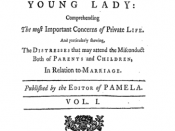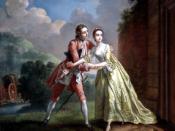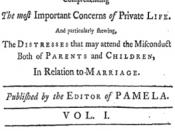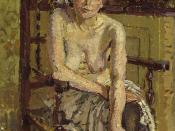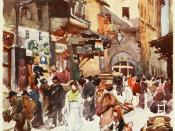Clarissa emphasises how, in RichardsonÃÂs time, a womanÃÂs morality was defined by sex, and her virginity was constantly under siege from more experienced and stronger men. Masculine and feminine qualities were put in distinct contrast. The masculine figure was to be virile and powerful with dominant control. ÃÂDesireÃÂ is an emotion directed towards attaining or possessing an object from which pleasure or satisfaction is expected. Therefore ÃÂmasculine desireÃÂ can be seen as an instinctive, impulsive craving to possess. The ÃÂRake figureÃÂ is the symbol and embodiment of masculine desire, having self-indulgent behaviour, unconstricted by moral law. He follows his inclinations to triumph over the female sex, but keeps control over them. However, the impulsions created by lust and appetite can lead to a loss of control, to weakness and vulnerability, contradicting the firm image of ÃÂmasculinity.ÃÂ Love, as an emotion, can cause weakness and the ÃÂunmanningÃÂ of a Rake. However, Rakes are not meant to be capable of this true affection, or of ÃÂunderstandingÃÂ or connecting with womenÃÂs minds.
Masculine desire can be seen as purely physical, and Rakes maintain their control through this physicality. A Rake may have emotions but he must hide them due to pride, developing an inner struggle of anxiety and insecurity. This private inner struggle is represented through RichardsonÃÂs use of the epistolary form and his use of language in Clarissa, especially with the Rake Lovelace. The letter form is a unique way of exposing the seemingly realistic thoughts and conflicts of character. Lovelace needs control and manipulates and orchestrates the events that lead to the rape of Clarissa Harlowe. However, we are given insight into LovelaceÃÂs inner conflict, and this shows he has contradictions with his masculinity. The representation of real human emotion challenges the idea of an aloof ÃÂRake figureÃÂ. A Rake is not supposed to love.
Lovelace is sexually aggressive, has power over other characters and uses disguises to manipulate. He has a rakish attitude, and quotes from a poem by Edmund Waller; ÃÂWomen are born to be controlledÃÂ (p.670). He wants absolute power over a woman, pursuing and ÃÂhuntingÃÂ her down in an unbalanced contest. Lovelace says rakes ÃÂseldom meet with the stand of virtue in the women whom they attemptÃÂ (p.426), which is why Clarissa is such a challenge. He is arrogant, saying to his companion Belford, ÃÂHas it not been a constant maxim with us that the greater the merit on the womanÃÂs side, the nobler the victory on the manÃÂs?ÃÂ (p.559). He is intrigued by ClarissaÃÂs ÃÂinflexible heartÃÂ, seeing her as ÃÂthis charming frost pieceÃÂ (p.145). He sees the ÃÂrewarding endÃÂ of controlling Clarissa as ÃÂa triumph over the whole sexÃÂ (p.147). Samia Ishak recognises that, ÃÂHe believes once a woman is subdued, she will always be subdued,ÃÂ and this is why he tests whether ClarissaÃÂs virtue is strong enough to prevent him. Their characters are so different, with LovelaceÃÂs representation being ÃÂa complementary portrait to that of ClarissaÃÂ Clarissa stands for spirituality, but Lovelace stands for sensuality.ÃÂ To him, she appears to have a pure mentality and her innocence is an attraction for lechery.
At first, he appears not to care for ClarissaÃÂs feelings. When he has first succeeded in tricking her to run away with him, he says ÃÂThe sex! The sex is all over! ÃÂ Ha, ha, ha, ha! I must here ÃÂ I must here lay down my pen to hold my sidesÃÂ (p.400). This is a realistic image, expressing LovelaceÃÂs maliciousness and the pride he has in his trickery. He has a love of plots and disguises, being a perverse kind of artist figure and egotist. In response to his manipulation of Clarissa, Lovelace declares, ÃÂHow unequal is a modest woman to the adventure when she throws herself into the power of a rake!ÃÂ (p.465). However, she has not ÃÂthrown herselfÃÂ into his power, he has tricked her. He has spoken disapprovingly of ClarissaÃÂs family but won her back by showing letters from his aunt and cousin. He then tricks her into going to London, and gets his friend Mr Doleman to write to them about lodgings. Clarissa picks what seems to be the best, Mrs SinclairÃÂs house on Dover Street, but Lovelace reveals to Belford the house is not owned by Mrs Sinclair, or on Dover Street. He has control of the situation, being the manipulator. He goes to great lengths to win back her affection and sympathy, at one point even feigning illness by using pigÃÂs blood.
To control Clarissa, he pretends to be virtuous, but does not actually reform, wearing ÃÂthe guise of a merit-doubting hypocrisyÃÂ (p.145). ÃÂPlay-actingÃÂ is at the heart of his deception. When he finds Clarissa in Mrs MordenÃÂs house, after she has become suspicious of his trickery and fled from Mrs SinclairÃÂs, they row in front of Mrs Moore, Miss Rawlins and Widow Bevis. She says ÃÂAm I not my own mistress! - Am I not -ÃÂand he interrupts her, raising ÃÂhis voice to drown hers.ÃÂ He describes his appearance; ÃÂI lowered my voice on her silence. All gentle, all entreative, my accent; my head bowed; one hand held out; the other on my honest heartÃÂ (How considerable this made me look to the women!)ÃÂ (p.777). He has manipulated the women into believing his lies, gaining control over them and therefore over Clarissa.
He enjoys manipulating Clarissa but at the same time he admires her. He tests her virtue, but he is also tested as he allows himself to respect her. Lovelace writes to Belford, ÃÂThe moment I beheld her, my heart was dastardized, damped, and reverenced-over. Surely this is an angel, Jack!ÃÂ (p.642). His personality is beginning to show a fracture, as he is entranced by the very purity he loathes. The Rake figure is meant to be careless, having a casual approach, but there is a ÃÂparadoxical prudenceÃÂ to the RakeÃÂs career. His manipulation is too full of thought, suggesting its object, Clarissa, is meaningful. Lovelace says he is to be ÃÂinevitably manacledÃÂ in his own ÃÂwebÃÂ, even in the first part of the novel (p.517). ClarissaÃÂs illness at the news of her fatherÃÂs curse frightened Lovelace into a genuine proposal. As he prepares for London, he describes a battle with his roguish heart, questioning himself when contemplating marriage; ÃÂWhat makes my heart beat so strong?ÃÂ (p.520). He sees himself as his ÃÂown enemyÃÂ as he appears to warm to marriage, but continues to discuss his plots. He knows James Harlowe and his friend Captain Singleton have given up their plot to kidnap Clarissa, but he will continue to pretend it is a threat, because ÃÂthe greater her disappointment, from them, the greater must be her dependence on [him]ÃÂ (p.520). He manipulates ClarissaÃÂs attachment to her family, one of her most admirable qualities, to gain even more power over her. Later, when he is talking of reuniting her with her family, he ÃÂaudibly sobbedÃÂ in response to her gratitude, being genuinely affected by this ÃÂodd sensationÃÂ (p.695). We do start to see LovelaceÃÂs confusion over his uncontrollable emotions, but he remains a manipulator. He always has a loophole, exposing his lack of ÃÂreal loveÃÂ for her.
Clarissa later recognises his complexities, saying, ÃÂhe is so much of the actor that he seems able to enter into any character; and his muscles and features appear entirely under obedience to his wicked willÃÂ (p.1003). His flamboyant use of language and false words signify his rakish nature, reflecting his complex psychological portrait. RichardsonÃÂs use of the epistolary form gives insight into how Lovelace thinks and feels, as Terry Eagleton says ÃÂwriting shares the fluidity of the soul.ÃÂ However, the letter is also ÃÂalienable, flushed with the desire of the subject yet always ripe for distortion and dishonour.ÃÂ This ÃÂdistortionÃÂ reflects LovelaceÃÂs character. We see the ÃÂduplicityÃÂ of Lovelace the person and Lovelace the rake, and his momentary fear that he is not as consistent a rake as he would like to be. There are conflicts in how he represents himself to others, and how he understands himself and his own motives. This confusion leads to his ÃÂunmanningÃÂ. Ishak has written a stylistic study of the language of Clarissa. She says some letters are punctuated with ÃÂsufferings and distresses of their writerÃÂ and ÃÂare highly revelatory of their originatorÃÂs feelings, thoughts and intense emotional tension.ÃÂ When writing to Belford, Lovelace poses many questions to him. Ishak says some of these are ÃÂruminative questionsÃÂ containing the questionerÃÂs own thoughts, and at times communicate a sense of ÃÂself-examination or self-reproachÃÂ. This undermines the confidence and arrogance Lovelace is meant to have, exposing some of his anxiety. He uses direct, ÃÂself-justificatory questionsÃÂ aimed at Belford, in attempt to soothe his conscience and justify his actions. For example, early in the novel Lovelace tries to get Belford to agree with his reasons for his plots; ÃÂWhy, why will the dear creature take such pains to appear all ice to me? [...] Hast thou not seen, in the above, how contemptibly she treats me?ÃÂ (p.413). He also asks himself ÃÂself-directed questionsÃÂ, when writing to Belford, where he reveals his puzzlement and suspicious nature; ÃÂIs not this the hour of her trial? [...] Whether her frost be frost indeed? Whether her virtue be principle?ÃÂ (p.878-9). The repetition of ÃÂwhetherÃÂ reflects the debate inside his head - should he put Clarissa to the test or not. These ruminations contain ÃÂtheir writerÃÂs thoughts, fears and tension,ÃÂ and Lovelace is portrayed as hesitant rather than controlling.
The novel emphasises the battle between the opposed forces of masculinity and femininity. But there are ÃÂcross-gender identificationsÃÂ that show they are not actually as separate as they seem. Clarissa begins to gain some control, and Lovelace loses it. At Mrs SinclairÃÂs whorehouse, after the fire, Clarissa thinks Lovelace is going to rape her as he comforts her. Lovelace is intrigued by her defiance, saying, ÃÂI never before encountered a resistance so much in earnest [...] What a triumph has her sex obtained in my thoughts by this trial, and this resistance!ÃÂ (p.727). He then exclaims, ÃÂun-rakishlyÃÂ, ÃÂNow is my reformation secured; for I never shall love any other woman! ÃÂ Oh she is all variety! She must be ever new to me!ÃÂ (p.722). He is being controlled by her. Clarissa declares she will not see him for a week as she thinks the fire was a trick. She escapes to the house owned by Mrs Moore. She has control and their roles reverse momentarily. Lovelace immediately switches his tone to anger, seeing her sex as ÃÂplaguyÃÂ, with ÃÂevery individual a plotter by natureÃÂ (p.737). He sees her as having the stance of a ÃÂplotterÃÂ now, instead of himself.
After her escape in this part of the novel, LovelaceÃÂs contradictory thoughts become more apparent. He argues with himself, angry that she has conversed with Dorcas to give her food so she did not have to eat with him: ÃÂShe is odious in my eyes; I hate her mortally! ÃÂ But oh! Lovelace, thou liest! ÃÂ She is all that is lovely! All that is excellent! ÃÂ But is she, can she be gone!ÃÂ (p.738). The short sentences emphasise his contradictions in thought. He appears to miss her, ÃÂsighing over the bed and every piece of furniture in itÃÂ. After finding a letter in her room addressed to him, he ÃÂtrembledÃÂ as if overcome. This is when he says ÃÂHow does this damn love unman me! ÃÂ But nobody ever loved as I love! [...] Ungrateful creature, to fly from a passion thus ardently flaming!ÃÂ (p.742). He only loves his control of her, his passion of lust, and sees her negatively, as ÃÂungratefulÃÂ. Upon reading the contents of the letter he admits she has control over him, then saying, ÃÂI can subscribe with too much truth to those lines of another poet [Nathaniel Lee, 1679]:She reigns more fully in the soul than ever;She garrisons my breast, and mans against meEvÃÂn my own rebel thoughts, with thousand graces,Ten thousand charms, and new-discoverÃÂd beauties!ÃÂThere are masculine images of triumph and control here. The word ÃÂgarrisonÃÂ is associated with the military, suggesting she controls his heart, and is stationed there. She ÃÂmans againstÃÂ him his ÃÂown rebel thoughtsÃÂ, which suggests her virtue is affecting him. In contrast however, when he then reads Anna HoweÃÂs letter to Clarissa, he is infuriated, marking the words that require ÃÂvengeanceÃÂ as they urge him to ÃÂpunish themÃÂ (p.752). Lovelace wavers between his affections for Clarissa and his inherent ÃÂLibertine waysÃÂ, exposing his intimate feelings. He reveals his emotions to Belford, yet he is still controlled by his will for manipulation, through revenge. His ÃÂmasculineÃÂ qualities are still present, and he is not completely ÃÂunmannedÃÂ.
Towards the end of the novel, the inversion of control between Clarissa and Lovelace is made even more apparent. Just before her death, Belford says to Lovelace, ÃÂyou will find the sense surprisingly entire, her weakness consideredÃÂ (p.1349). Clarissa exerts the fullest possible ÃÂcontrol over her meanings, sustaining an enviable coherence of sense even through her worst trialsÃÂ, and this envy belongs to Lovelace; he contrastingly ÃÂlives on the interior of his proseÃÂ luxuriating in multiple modes of being.ÃÂ Lovelace may have physical strength but Clarissa has growing mental strength, controlling the narrative as she contemplates her death. He becomes ambiguous and complex, whilst Clarissa remains pure and becomes less ambiguous. She asserts power through her suffering ÃÂmoral authority,ÃÂ he, through callousness.
In the rape, she is a passive victim of male power. However, it is a shallow victory, with him humiliatingly having to drug her to rape her. Richardson does not give the rape a description; it is left out, an anticlimax that undermines the sexual act. Nobody experiences the rape. The rape, his moment of ÃÂvictoryÃÂ, actually initiates her slow death and the utter disintegration of Lovelace himself. Lovelace is portrayed as pathetic, and his ÃÂrakishnessÃÂ, for all its virile flamboyance, is nothing less than ÃÂa crippling incapacity for adult sexual relationship. His misogyny and infantile sadism achieve their appropriate expression in the virulently anti-sexual act of rape.ÃÂ LovelaceÃÂs sexual anxiety stems from his dread of losing the very ideal he desires. He cannot contemplate that ÃÂClarissa is not to be possessedÃÂ and so ÃÂhis precarious self enters upon steady dissolution.ÃÂIronically, Lovelace lacks the strength power to deal with contradictory impulses. Before Clarissa dies he says, ÃÂI am not the savage which you and my worst enemies think me. My soul is too much penetratedÃÂ ÃÂ (p.1339). He is also talks of ÃÂexcruciating pangs the condemned soul feelsÃÂ (p.1340). He later chastises himself for letting his rakishness cause her death; ÃÂMarry and repair, at any time; this (wretch that I was!) was my plea to myselfÃÂ yet [she], from step to step, from distress to distress, to maintain her superiorityÃÂ No power left in me to repair her wrongs! - No alleviation to my self-reproach!ÃÂ (p.1344). He now calls her, ÃÂmy Clarissa LovelaceÃÂ (p.1385). He is tormented by his actions, saying, ÃÂThese reflections sharpened, rather than their edge by time abated, accompany me in whatever I do, and wherever I go,ÃÂ (p.1483). He regrets his rakish behaviour, using strong language such as, ÃÂI feel the torments of the damned, in the remorse that wrings my heart on looking back upon my past actions by herÃÂ (p.1333). His rakish principles do not seem to drive him any more and Lovelace deteriorates as a symbol of masculine desire. His is restless and in agony, declaring in a letter to Belford, ÃÂO my dearest, and ever-dear Clarissa, keep me no longer in this cruel suspense; in which I suffer a thousand times more than ever I made thee sufferÃÂ (p.1335). He becomes passive and disempowered, changing from being the oppressor to the oppressed, becoming a ÃÂvictimÃÂ himself. He still tries to resist ÃÂreformingÃÂ, by saying he will reform once he returns from France. However, his death in the duel with Morden out in France, emphasises the loss of his masculine identity, as well as his masculine power. At the end he is no longer at the centre of the plot, with his death narrated by a French valet, a stranger.
In Clarissa, ironically, the threat of male sexuality is tested by virtue. Clarissa challenges LovelaceÃÂs right to superior status, refusing to accept a hierarchy based on gender, having moral basis for actions instead. Clarissa who appears vulnerable has more control, through her death, than the male protagonist. When Clarissa questions the Rakish framework, by refusing to accept her role of sexual sinner, LovelaceÃÂs ÃÂpose falters and we find that the defiance of convention has its own conventional limits.ÃÂ The manipulative power he had at the start has disintegrated. Lovelace is never consistent in being the tyrannical rake. Cohan says ÃÂwhen she rejects him after the rape Clarissa forces Lovelace to acknowledge the many inconsistencies in his character which the rake type cannot include.ÃÂ His feelings for her continue even after sexual conquest and so Lovelace moves away from being a purely sexual figure. He does not know how to love; ÃÂClarissa stands for love; Lovelace stands for malevolence; he is ÃÂLovelessÃÂ.ÃÂ Yet his inner struggle illuminates the contradictions of this ÃÂpureÃÂ masculine desire. He feels guilt and regret as he realises his moral faults and their consequences after ClarissaÃÂs death, accepting and acknowledging his ÃÂloveÃÂ for her, horrified by his rakish behaviour. He is a realistic character and his masculine desire led to the loss of his masculine identity. Masculine desire does have a limit, as not everything can be possessed.
Primary text used:ÃÂRichardson, Samuel, Clarissa, or, The History of a Young Lady, ed. Angus Ross, (London: Penguin Books Ltd., 2004).
Secondary Criticism:ÃÂBatsaki, Yota. ÃÂClarissa; or, Rake versus UsurerÃÂ CALIBER, 93 (2006), 22-48.
ÃÂBiggs, Penelope, ÃÂHunt, Conquest, Trial: Lovelace and the Metaphors of the RakeÃÂ, Studies in Eighteenth Century Culture, 22 (1982), 51-64.
ÃÂCohan, Steve, ÃÂClarissa and the Individuation of CharacterÃÂ ELH, 43 (1976), 163-183.
ÃÂEagleton, Terry, The Rape of Clarissa (Oxford: Basil Blackwell Ltd., 1982).
ÃÂGwilliam, Tassie, Samuel RichardsonÃÂs Fictions of Gender (California: Stanford University Press, 1993).
ÃÂIshak, Samia Fahmy, A stylistic study of the language of RichardsonÃÂs Clarissa, Thesis (Ph.D.) University of Leeds (Department of Linguistics and Phonetics), 1980.
